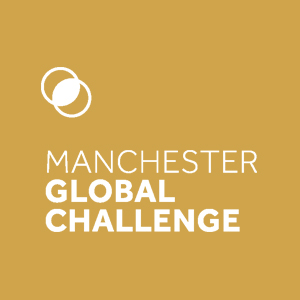Manchester Global Challenge Experiences
This page provides details of the experiences that you might count towards your Global Challenge. Some are overseas but many can be completed here in Manchester. Click on the numbered headings below to find out more.
Please note that, for on-campus and local opportunities (options 5-8 below), you will be expected to complete at least 20 hours of your "experience" for it to count towards the Global Challenge.
What counts?:
1. Study abroad:
A semester or year-long period of study abroad at an overseas partner university can count towards a Global Challenge.
This period of study abroad can be a required or optional part of your degree programme. For example, all of the following would be accepted:
(a) a study year abroad at the Jordan Language Academy in Amman undertaken by a student pursuing a degree in Arabic/Middle Eastern Studies;
(b) a study year abroad at the University of Auckland, New Zealand, undertaken by a student pursuing a degree in ‘Geography with International Study’;
(c) a study semester abroad at the University of British Columbia, Canada, undertaken by a student pursuing a degree in Life Sciences, Politics, Philosophy etc etc.
(d) an international student studying for a semester, a year or full degree at The University of Manchester.
Most degree programmes at The University of Manchester provide the option to spend a semester or year abroad during the 2nd year of a 3 year degree programme or the 3rd year of a 4 year degree programme.
Find out more at: http://www.goabroad.manchester.ac.uk/what-can-i-do/study/
2. Overseas work experience:
A semester or year-long period of work abroad with an overseas organisation.
This period of work will normally be a ‘required’ and approved part of your degree studies (but you may have the option as to whether or not you undertake the work placement in the UK or overseas). Examples of periods of work abroad that would be accepted for the Manchester Global Award might include the following:
(a) a work placement ‘block’ at a hospital in Kathmandu, Nepal undertaken by a student pursuing a degree in Medicine;
(b) a work placement year abroad at Boehringer Ingelheim Ltd in Austria undertaken by a student pursuing a degree in ‘Pharmacology with Industrial Experience’;
(c) a work placement year abroad at L’Oreal in France undertaken by a student pursuing a degree in ‘Chemistry with Industrial Experience’.
3. Short term study overseas:
A short-term period of study abroad normally undertaken during a University vacation, for example a University supported Summer School.
http://www.goabroad.manchester.ac.uk/what-can-i-do/summer-opportunities/
4. Overseas Volunteering:
An overseas volunteering experience (normally undertaken during a University vacation).
Opportunities of volunteering that would be considered suitable are those which require a significant level of integration into a host community, working alongside the hosts for a period of three weeks or more. Those experiences which are very short-term or are a small part of a commercial tourist trip would not be accepted.
Examples of overseas volunteering that would be accepted for the Manchester Global Challenge include the following:
(a) A University supported international volunteering opportunity for example Team Uganda, or a minimum of three weeks volunteering with one of the University’s Trusted Partners;
(b) a six week trip volunteering in Nepal, supporting a local charity on an environmental / health / education initiative;
The following would not count:
(a) a four week trip in South Africa through a commercial tour company, including three weeks of Safari and a few days visiting an orphanage in a local township.
Find out more about University supported international volunteering opportunities and advice on finding your own opportunities: www.manchester.ac.uk/internationalvolunteering.
5. Tandem learning:
This is a reciprocal language learning course in which students are paired with a native speaker of the target language to work on a series of independent language learning tasks. For many students, this course is an opportunity to become more familiar with the target language and culture prior to a semester or academic year abroad; for others, it is an opportunity to maintain a good level of spoken and written proficiency in the target language following a period spent abroad. Native English speakers are paired with a French/German/Italian/Spanish/Portuguese student. Native speakers of French/German/Italian/Spanish/Portuguese are paired with native English speaker.
You meet with your partner for 2 hours per week to complete a number of specially designed learning tasks. Some tasks may be negotiated with your partner/course tutors; some are compulsory. You will also participate in two or three tutor-led sessions over each semester as well as a virtual seminar on language and culture.
Find out more at: http://www.ulc.manchester.ac.uk/languages/leap/tandem/
6. International society volunteering:
The International Society is an independent, not-for-profit organisation that aims to provide international students with a warm and friendly welcome when they arrive in the city and to ensure their experience of the UK is a good one. They have around 7,000 members from over 130 countries each year. The International Society runs a number of projects you can volunteer on which will count towards the Global Award:
RocketWorld - This is an intercultural learning adventure for 7-11 year olds, which takes place for a day in local schools.
International 16 - This group provides the inspiration and creativity for new projects promoting international peace and friendship, celebrating cultural diversity and connecting people around the world.
Volunteering with the International Families' Group - The Families' Group aims to bring people in the same situation together so they can bring along their babies and children, make friends and have fun, with a wide variety of activities arranged by volunteers for the group through the year.
Volunteer Teaching - The International Society runs a wide range of language classes, with the vast majority of the volunteer teachers being students at the Universities in Greater Manchester who want to share something of their culture and language and get some teaching experience.
To find out more about volunteering with the International Society contact: samharris@internationalsociety.org.uk.
7. Volunteering with Multilingual Manchester:
Manchester's language and cultural diversity is one of its outstanding assets: More than 200 languages are spoken in the Greater Manchester area.
Multilingual Manchester is based in the School of Arts, Languages and Cultures and brings together university students, experienced researchers of international repute, community representatives, and members of local services to run a range of activities. These activities aim to:
- Promote awareness of language diversity;
- Identify and respond to language needs (such as foreign language learning, access to English courses, and maintenance of heritage languages);
- Document and inform about some of the smaller languages spoken in the city.
Volunteering for Multilingual Manchester could include working on activities such as:
Manchester Royal Infirmary – Mapping staff language skills, and documenting the patient experience of non-English speakers, to improve services to Manchester residents.
Greater Manchester Fire & Rescue Services – Accompany staff on fire safety information activities to minority communities.
MLM events and outreach - Helping to organise and deliver anything from conferences, exhibtions and talks for groups in the local community: from local service prividers and businesses to schools and community groups.
Neighbourhood Policing - Helping to compile phrases and greetings in minority languages for community officers.
NHS communication team – Volunteer support is needed to organise translations of video information on access to health care (volunteers may be translating or organising translations).
To find out more about volunteering for Multilingual Manchester contact: mlm@manchester.ac.uk
8. The Online +Social Good community:
You can get involved with the Mashable social good community:http://www.plussocialgood.org/News).
The community is exploring the ways social media can be used to the global social good. The community is international with members from all parts of the globe. The community links to the annual Social Good Summit which takes place in late September every year (http://mashable.com/sgs/). You do not have to attend the conference though you might wish to do so. What you are asked to do is to demonstrate your active involvement with the community. You can, for example, submit content to the community, or host a social goods event: http://www.plussocialgood.org/page/host or form your own Meetup group as a part of the summit itself http://mashable.com/sgs/#action.
You will need to evidence your involvement, for example through screengrabs of content or through url links to your content.
Something else?
If you have undertaken or are planning on undertaking an activity which you feel has given you the relevant experience but is not listed above please contact us at ucil-challenges@manchester.ac.uk with information about the experience in order for it to be assessed against the criteria for the Global Challenge.



